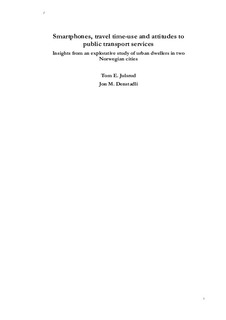| dc.contributor.author | Julsrud, Tom Erik | |
| dc.contributor.author | Denstadli, Jon Martin | |
| dc.date.accessioned | 2018-04-10T07:25:04Z | |
| dc.date.available | 2018-04-10T07:25:04Z | |
| dc.date.created | 2017-05-12T16:57:16Z | |
| dc.date.issued | 2017 | |
| dc.identifier.citation | International Journal of Sustainable Transportation. 2017, 11 (8), 602-610. | nb_NO |
| dc.identifier.issn | 1556-8318 | |
| dc.identifier.uri | http://hdl.handle.net/11250/2493313 | |
| dc.description.abstract | The uptake of mobile media with internet connection has increased rapidly in almost every part of the world, and this has significantly changed how public transport passengers use their travel time. Studies have documented that use of mobile information and communication technologies (ICT) while traveling has the potential to enrich use of travel time and in some cases, strengthen positive attitudes towards public transport. The alternative hypothesis—that mobile communication technologies make travelers more critical and demanding, e.g., due to the risk of interference—has so far hardly been explored through empirical studies. Based on a web-based survey of travelers in two of the largest cities in Norway (Oslo and Trondheim), this paper investigates how use of smart devices are related to general attitudes toward public transportation services. A segmentation of travelers in three clusters based on their mobile use habits, shows that the most active group of mobile media users—a group of younger and middle-aged urban dwellers—were those who bore the most critical attitudes to the public transport services. In contrast, the groups that used their mobile phones rarely, or less actively, on their public transport trips were more satisfied. The findings suggests that a new generation of “equipped travelers” has developed expectations regarding their public transport journeys that service providers might have problems to fulfill in current times. Thus, there is a risk of the most active smartphone users developing negative attitudes to public transport if (or when) their experiences are not improved. | nb_NO |
| dc.language.iso | eng | nb_NO |
| dc.publisher | Taylor & Francis | nb_NO |
| dc.title | Smartphones, travel time-use, and attitudes to public transport services. Insights from an explorative study of urban dwellers in two Norwegian cities | nb_NO |
| dc.type | Journal article | nb_NO |
| dc.description.version | submittedVersion | nb_NO |
| dc.source.pagenumber | 602-610 | nb_NO |
| dc.source.volume | 11 | nb_NO |
| dc.source.journal | International Journal of Sustainable Transportation | nb_NO |
| dc.source.issue | 8 | nb_NO |
| dc.identifier.doi | 10.1080/15568318.2017.1292373 | |
| dc.identifier.cristin | 1470003 | |
| dc.description.localcode | This is an [Original Manuscript] of an article published by Taylor & Francis in [International Journal of Sustainable Transportation] on [08 Feb 2017], available at https://www.tandfonline.com/doi/full/10.1080/15568318.2017.1292373 | nb_NO |
| cristin.unitcode | 194,60,10,0 | |
| cristin.unitname | NTNU Handelshøyskolen | |
| cristin.ispublished | true | |
| cristin.fulltext | preprint | |
| cristin.qualitycode | 1 | |
